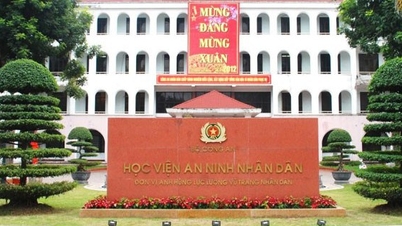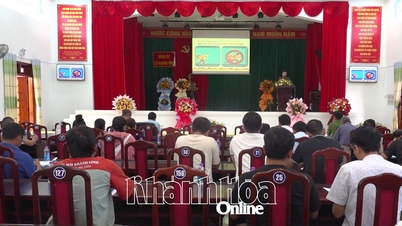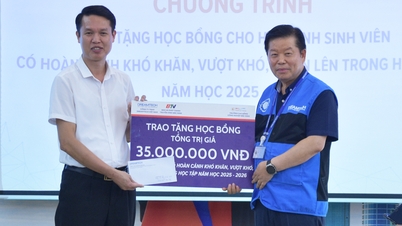According to Lieutenant General, Professor, Dr. Tran Minh Huong - Director of the People's Police Academy, digital transformation is becoming an inevitable trend and a strategic driving force in the process of national modernization, especially in the field of education and training. In the context of the strong development of the Fourth Industrial Revolution, the construction and development of digital libraries is not only a requirement for innovation in organizational models, but also an inevitable method to optimize the storage, access and exploitation of knowledge to serve learning, research and teaching activities in higher education institutions in our country.
For the People's Police schools in general and at the People's Police Academy in particular, the library plays a very important and necessary role, providing, organizing and preserving learning resources to support the teaching and scientific research of each lecturer and student. The construction and development of the digital library at the People's Police Academy is not only to modernize library work, but also a strategic step, concretizing major policies and guidelines of the Party, State and Ministry of Public Security on promoting digital transformation in education and training activities in the People's Police force.

Lieutenant General, Professor, Dr. Tran Minh Huong - Director of the People's Police Academy
Lieutenant General Tran Minh Huong said that in recent years, under the close direction of the Party Committee and the Board of Directors of the Academy, the work of building and developing the digital library at the People's Police Academy has been identified as one of the key tasks in the comprehensive digital transformation roadmap, serving the goal of training high-quality human resources for the People's Public Security Forces. This activity has recorded many outstanding results, demonstrated through the following aspects:
Firstly, on investing in and developing technical and technological infrastructure to serve the needs of building and developing digital libraries.
Since 2014, through an international cooperation project with KOICA (Korea), the People's Police Academy has successfully implemented the "Electronic Library Construction Project", marking an important turning point in the process of digitizing the library at the Academy. The project has equipped a modern information technology infrastructure system including: 06 DELL R730 servers, 14 Cisco 2960 network switches, 02 48TB SAN storage devices, 01 Dell Sonic security firewall, and 100 desktop computers to serve readers. The internal network infrastructure has been expanded with nearly 300 wifi transmitters and more than 1,000 wired network nodes connecting lecture halls, dormitories, and headquarters. The connection of the Ministry of Public Security's wide area network (WAN) and the internal network (LAN) has ensured secure access in the internal industry environment.
Second, about the application of library management software and document digitization system.
The People's Police Academy has selected and deployed Tulip library management software, one of the advanced solutions to support the overall management of library activities, from document addition, cataloging, classification, loan-return management to digital learning materials database management. This software has fully integrated the necessary subsystems such as OPAC (online catalog lookup), RFID (automatic loan-return), digital learning materials management, automated inventory and document maintenance. In particular, the dedicated document digitization system ScanRobot of Treventus (Republic of Austria) has been put into operation, helping the Academy to digitize documents quickly, accurately and effectively. This device allows scanning documents at speeds of up to 2,500 pages/hour, using automatic page-turning technology and optical character recognition (OCR) technology to create digital documents that can be edited and searched for content.
By the end of 2024, the Academy has digitized over 15,000 documents. These learning resources are stored and exploited through the library software system, serving on-site research as well as accessing via the internal network.

Police Professional Library.
Third, regarding digital library services and reader services. Currently, on the 9th and 10th floors of the Police Professional Library building, the Academy has established a modern electronic library space capable of serving 250 to 300 people at the same time. Readers can book their own study rooms through the Opac page and Tulip electronic library software for group study. In addition, the virtualized workstation search system, wifi zone and online group study room have created favorable conditions for learners to access digital resources proactively and flexibly.
In addition, the People's Police Academy also deployed an automatic document borrowing and returning system using RFID cards combined with personal library cards. The 24/7 book return system located in the library lobby helps readers be more flexible in returning documents. The process of borrowing and returning documents is fully automated, reducing pressure on librarians and improving the accuracy of document circulation. In parallel, the Academy also regularly organizes communication activities, guides on using digital libraries, regularly updates new document catalogs and improves the user interface on the Tulip system to enhance user experience.
It can be said that the implementation of the digital library at the People's Police Academy in recent times has brought about many practical results, contributing to improving the quality of education, training and scientific research of the school. These results are not only reflected in the modernization of infrastructure and technology, but also a step forward in information management thinking, serving more effectively the learning, teaching and research needs of the teaching staff and students.
Thanks to the application of a modern management system, library management at the Academy has been completely digitized, reducing manual work and increasing operational efficiency. Book inventory, document statistics, tracking of borrowing and returning, library card management, analysis of reader needs, etc. are all performed automatically, helping to save human resources and increase operational accuracy. In addition, the digital library system has created a favorable foundation for scientific research activities at the Academy, especially in searching, comparing, using and citing document sources to serve the process of building theses, dissertations and scientific topics.
Many staff, lecturers and students highly appreciate the library's provision of complete digital data that can be accessed quickly and accurately, helping to save time and improve the quality of research. In addition, the system also provides tools to support analysis and information synthesis, helping researchers easily systematize data, search by topic, keyword or classify in-depth expertise according to the CAND industry code.
This is especially useful for professional research, which requires a high level of systematicity, confidentiality, and specialization.

Space for students to do self-study at the Police Professional Library.
Lieutenant General Tran Minh Huong said that, in response to the requirement to modernize the library system in the People's Public Security Forces and successfully implement the "Digital Transformation Program for the Library Sector by 2025, with a Vision to 2030" in accordance with Plan No. 143/KH-BCA-X03, dated April 8, 2021 of the Ministry of Public Security, continuing to improve and develop the digital library at the People's Police Academy is a strategic, urgent and long-term task. To realize the goal by 2030, the People's Police Academy focuses on implementing the following specific and key groups of solutions:
Firstly, focus on building a comprehensive digital library development strategy with a specific roadmap to 2030. This strategy does not stop at digitizing documents, but also covers the development of technology infrastructure, application of modern management software, expansion of digital learning space, integration of domestic and international learning data, improvement of library human resources quality and especially ensuring safety and security of information in the entire system. Establishing a clear strategy will create a unified foundation for direction and operation, and at the same time be the basis for allocating investment resources reasonably and effectively in each stage of development.
Second, continue to invest, upgrade and complete the technical infrastructure serving the digital library. In particular, focus on improving the quality of the server system, large data storage devices, terminals serving users (computers, lookup workstations, automatic borrowing and returning machines) and the internal LAN covering the entire Academy. In addition, add specialized equipment such as modern robot scanners, security camera systems, backup generators, lightning protection systems and standard server rooms, ensuring information security and stability during operation. The application of new technologies such as artificial intelligence (AI), big data analysis (Big Data), cloud computing technology will help the library effectively manage data, optimally serve users' search needs and support the school's decision-making.
Third, promote the standardization and development of available digital scientific materials. In particular, prioritize the systematic digitization of training documents such as textbooks, electronic lectures, reference materials, scientific research topics, theses, dissertations, graduation theses, etc. Digitization must go hand in hand with data description according to international standards such as MARC21, Dublin Core to ensure effective searching, retrieval and sharing. At the same time, build a shared open learning materials database throughout the Academy, gradually connecting with digital libraries in the Public Security force to form a unified and interconnected CAND electronic library network. In addition, the Academy continues to research and reasonably exploit international electronic databases and reputable foreign language documents to improve the quality of learning, research and international integration.
Fourth, develop a team of librarians to meet the requirements of operating a modern digital library. This is one of the key steps that determines the effectiveness of digital library transformation activities. The Academy organizes intensive training courses on electronic library operations, digital skills, data processing and information technology applications for librarians. At the same time, build a mechanism for arranging and using human resources in a stable and highly specialized direction. In addition, encourage librarians to participate in research topics, innovative and creative activities in the library field, contribute initiatives to improve management software, and enhance services for readers.
Fifth, building a digital library system with the goal of connecting and sharing. Accordingly, the Academy focuses on researching and advising on the establishment of a multi-platform integrated electronic library portal, synchronizing data from many learning resources, with the ability to share according to internal authorization and connect with educational institutions and academies inside and outside the industry. The library management model needs to aim for connectivity with the digital learning materials system of the Ministry of Public Security and other police schools. This not only expands training resources but also promotes interdisciplinary and academic research and knowledge sharing throughout the force. In particular, connecting with key university library systems and national libraries (within the permitted scope of security) will create opportunities to access a huge knowledge base, effectively serving scientific research and training program development.

Reading room at the Police Professional Library.
Sixth, ensure security, information safety and state secrets in all digital library activities. The Academy applies technical and professional measures to protect the database system, including setting up security layers, data encryption, access authorization, access account management, periodic data backup and recovery in case of incidents. Develop strict internal regulations on document security, especially for professional documents and documents in the list of state secrets. The operation of the digital library system must strictly comply with the Law on Cyber Security, the Law on Protection of State Secrets and the regulations of the Ministry of Public Security on ensuring information security and safety in cyberspace.
Seventh, promote the development of reading culture, digital learning culture, and arouse the spirit of self-study and research among staff, lecturers and students through the effective exploitation of digital libraries. The Academy continues to organize activities to guide the use of electronic libraries, raise awareness, launch movements of learning and scientific research on digital platforms, and make the use of digital libraries an indispensable part of the training process, contributing to promoting active, proactive and creative learning methods, in line with modern training trends and international integration./.
Source: https://bvhttdl.gov.vn/phat-trien-thu-vien-so-tao-nen-tang-thuan-loi-cho-cac-hoat-dong-nghien-cuu-khoa-hoc-tai-hoc-vien-canh-sat-nhan-dan-20251010104345887.htm


![[Photo] Standing member of the Secretariat Tran Cam Tu works with the Standing Committee of the Party Committee of the Ministry of Health](https://vphoto.vietnam.vn/thumb/1200x675/vietnam/resource/IMAGE/2025/10/10/1760079818773_image-4-6972-jpg.webp)
![[Photo] "Exposing letters" in the flood center of Lang Son](https://vphoto.vietnam.vn/thumb/1200x675/vietnam/resource/IMAGE/2025/10/10/1760080117518_ndo_br_z7101324112737-07cd4d1c01801a8ccf4ae0cbaf31c4a3-507-jpg.webp)



![[Photo] Unique Phu Gia horse hat weaving craft](https://vphoto.vietnam.vn/thumb/1200x675/vietnam/resource/IMAGE/2025/10/10/1760084018320_ndo_br_01-jpg.webp)



















































































Comment (0)